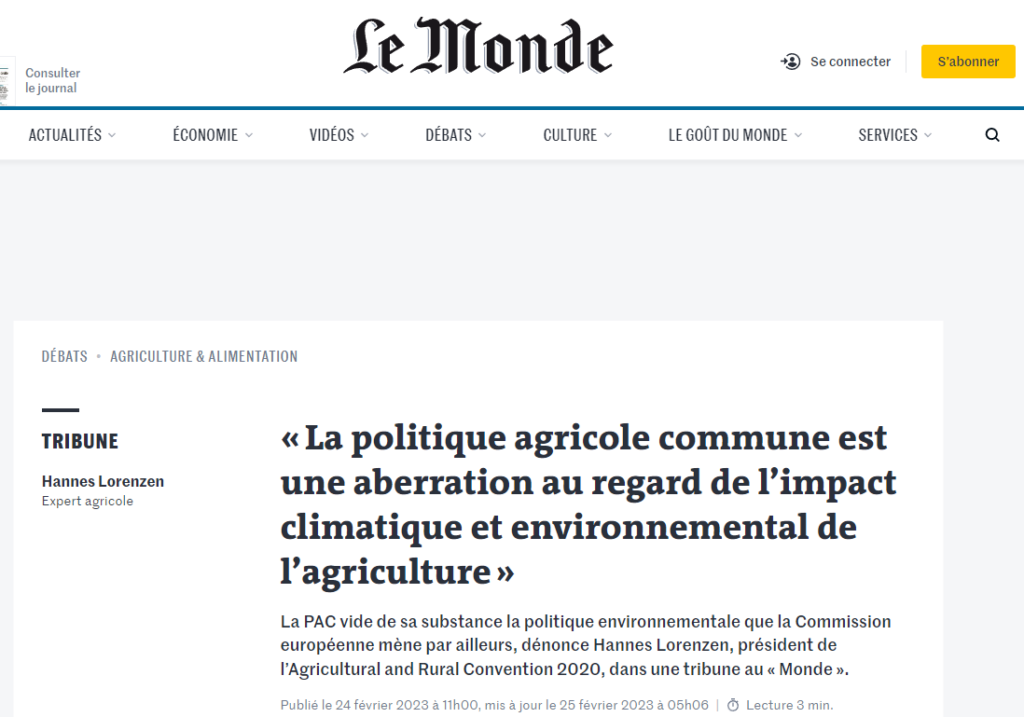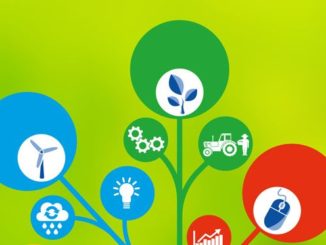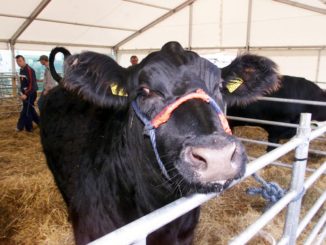
This weekend the Salon de l’Agriculture kicked off in Paris. Beyond the romanticised picture of farming presented at big agri-food fairs like this, the food and farming system shows no sign of change. So it is with the new CAP, which locks in unsustainable agricultural practices while eroding European cohesion. Carbon farming, offered as a solution, will change nothing in substance. Plus ça change, argues ARC2020 President Hannes Lorenzen in an Op-Ed for Le Monde.
Lire cet article en français
The Common Agricultural Policy (CAP) that came into force in January is a dinosaur. It maintains production practices that are not sustainable in the face of climate and biodiversity challenges, and weakens European cohesion. The European Commission has committed strategic errors in recent years. It has renationalised the CAP instead of reinforcing its role as a pillar of European integration and agroecological transformation. It has ceded to the pressures of Member States in favour of less common rules and under-ambitious agri-environmental restrictions. It has accepted that the CAP will not be subject to the ecological ambitions of the Green Deal – which was already too little, too late. As regards the climate and environmental impact of agriculture, it is an aberration. It would seem that nobody in Brussels has read the IPCC report on land use.
This CAP saps the climate and biodiversity commitments of the Paris agreement. If it remains as is, based on subsidies for fossil fuels, chemical fertilisers and pesticides, if the Green Deal does not transform extractive land use into an ecologically sustainable food and farming system by 2027, the Paris agreement will lose its relevance and Europe’s food sovereignty will be at risk.
The EU is structurally very dependant on imports of food and animal feed from third countries whose production systems are unsustainable and, in some cases, use slave labour. At the same time, the EU subsidises exports to developing countries with the effect of destabilisation of markets and food insecurity.
The war in Ukraine has revealed this dependence with surging prices of grain and sunflower oil. Grain leaving Ukraine was shipped to European meat producers before going to regions suffering from hunger. Under pressure from the agro-industry lobby, in particular COPA (Comité des organisations professionnelles agricoles de l’Union européenne) presided by Mrs Christiane Lambert, the political reflex of the EU’s agricultural ministers was to slash the few attempts at greening such as crop rotation and fallow land, on which production is now allowed. An agronomic, ecological and climate nonsense.
If this lobby continues to successfully block any concrete attempt by the European Commission to make a Green Deal work in practice, what’s left of the CAP risks being appended to national or regional cohesion policies without a specific agricultural or rural dimension. In this configuration, constrained by geopolitical realities, if Ukraine and the West Balkans join the EU as promised, it will be the end of the CAP as a pillar of European integration.
The Commission and the agro-industry are advancing carbon farming as a virtuous path for agriculture to contribute to cutting greenhouse gases. This would involve paying farmers – through the carbon market – by calculating per hectare how much carbon is stored by a crop or a meadow (which have always stored carbon). It’s a means on the one hand to allow landowners and land grabbers to make money, and on the other hand to continue with industrial crops, without for all that an effect on the climate or biodiversity, meanwhile undermining the legitimacy of the new CAP subsidies. The same actors keep their hands on the loot. Nothing changes in substance.
The EU continues to be unfair to the majority of its farmers and rural dwellers, to consumers and to its trading partners. Agricultural subsidies for the most part go to landowners who don’t need them. Food is ever more processed, less healthy and less affordable. Subsidised exports and food waste persist. The big agri-food fairs, Green Week in Berlin and Salon de l’Agriculture in Paris, reflect the inflexibility of the agri-food industry which is sticking to business as usual. Robots, big machines, the food industry are presented in an idealised depiction of small farming, suggesting to the visitors to these fairs that things are in place and under control. No sign of change in the food and farming system, of making it fairer or more resilient.
Expecting nothing more from Brussels, farmers, consumers and municipalities are taking food and farming into their own hands with Local Agricultural and Food Policies (Politiques agricoles et alimentaires communales, PAAC) as we highlight in our book Rural Europe Takes Action. These experiments ought to be integrated into the ongoing review of the national strategic plans for agriculture, and to inspire the new framework for CAP reform announced by the European Commission for the end of the year.
Republished with permission from Le Monde. View the original Op-Ed in French here.
More on System Change
A-ction, R-esilience, C-ritical Mass – Hannes Lorenzen’s Letter to 2023
New ARC Report | Carbon Farming – Stakes, Issues and Alternatives
Cross-Pollinating Resilience From Portugal: Nos Campagnes en Resilience in Plessé
Five Talks to Catch at Soup & Talk 2023 – this Saturday 21st January
Meet the Movement Linking Civil Society with Philanthropy for Food System Transformation
Cultivating The Future Together – ARC’s Rural Resilience Gathering in France
Oxford Real Farming Conference 2023 | Agroecology Movement Gathers for Hope and Action






